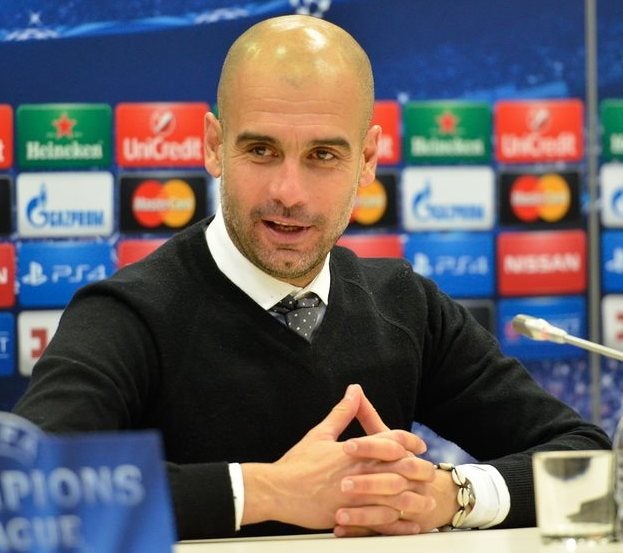
The tactics (and wardrobe) may have changed, but Pep Guardiola remains a consummate conductor
In May 2011 I was at Wembley to watch Pep Guardiola’s Barcelona sweep aside a Manchester United team that featured Wayne Rooney, Rio Ferdinand and Ryan Giggs to win the UEFA Champions League.
They moved and they passed, they moved and they passed – and they passed United into submission.
All the time Guardiola watched from his technical area. He was dressed like the man from Prada (or should that be Zegna?), never still, conducting the orchestra, playing each pass, demanding everything and often receiving it.
Those were happier times at Barca, a superclub now factionalised and often ponderous on the pitch. Lionel Messi played that evening at Wembley as a ‘false nine’, flanked on one side by Pedro, the son of a petrol pump attendant from Tenerife, and on the other by David Villa.
United’s central defenders did not know whether to track Messi or defend the empty spaces he left behind where a striker should have been.
Behind Messi in midfield were the masters of tiki-taka: Xavi, Andrés Iniesta and Sergio Busquets. Like Guardiola, Xavi, Iniesta and Messi were schooled at Barca’s Masia academy, and they had graduated with exceptional technique and a steely will to win.
Barcelona’s Brazilian former full-back Dani Alves once said of Xavi that he ‘plays in the future’ – by which he meant, I think, that Xavi has already played his next pass even before receiving the ball, so deft in his first touch and so total is his understanding of what is around him.
The season before the Wembley match, in a Champions League quarter-final, I’d watched Barcelona take on Arsenal at the Emirates Stadium in London. In the first 20 minutes of the game
Barca played a style of devastatingly fast-paced passing football, intricate and precise, of a kind I’d never seen before, and this was during an era when Arsène Wenger’s Arsenal were considered to be the most accomplished passing team in the Premier League. It was as thrilling as it was bewildering for the home fans, and all through the match Guardiola cajoled, directed, scolded and urged.
Guardiola left Barcelona in 2012, took a year out, living mostly in New York, then returned as the coach of Bayern Munich, where he fused Spanish tiki-taka with high-energy gegenpressing (the high press), popular in the Bundesliga, and championed back then in particular by Jürgen Klopp’s Dortmund.
Pep won three league titles at Bayern but, to his irritation, not the Champions League. His next stop was England and Manchester City, the club owned in effect by the nation state of Abu Dhabi.
Pep would have whatever he needed to create the team he desired. It’s often said that, because he always coaches clubs of remarkable riches, Pep could never achieve the kind of transformation Marcelo Bielsa has at Leeds or Claudio Ranieri did at Leicester.
At Manchester City Pep has a £50 million-plus player in nearly every position, and when there is a serious injury or someone falls short, he goes back into the market to buy a ready-made replacement.
Pep’s style of coaching is extraordinarily demanding, as if there’s something eating away at him, never allowing him to find moments of repose. Could it be that he once glimpsed the perfect game – perhaps in those opening 20 minutes at the Emirates in 2010 – and is endlessly trying to recreate it?
How else to account for his utter relentlessness, his fanaticism?
It certainly cannot be the desire to earn more money: he must already have more than he or his family could ever need, and nowadays the well-cut slim-fit suits, narrow ties and immaculate shirts of his match-day attire at Barca have been replaced by rugged sweatshirts and hooded slacker tops. Pep can afford and wear just what he wants so why not turn up on match day as if he’s come straight from the training ground?
Guardiola has reinvented Manchester City again during this strange season of lockdown, after a faltering start. Their record-breaking winning run coincided with the loss to injury of Kevin De Bruyne, the Premier League’s best player.
Guardiola’s response was of course to improvise. City started playing without a striker, and João Cancelo, the highly technical Portuguese defender, was used simultaneously in some games as an attacking full-back and midfield pivot.
David Moyes, the West Ham coach, was prompted to call Guardiola the ‘Heston Blumenthal of football’ because of his outlandish experimentation and ability to create winning outcomes from improbable juxtapositions and combinations.
Asked recently about his longevity as a coach and his continued success, Guardiola mentioned the infrastructure that supported him at City – and the players. ‘For a short time, you can do it without top players but sustaining for a long time – in an incredible organisation that supports their manager so the journalists and the players know he will not be sacked – this is so important. I never in my 12 years as manager scored a goal. I never saved a penalty. The artists are the players. All we can do is help them.’
He certainly helps them – and then some more.
Jason Cowley is editor-in-chief of the New Statesman
Image: wikimedia commons
Read more
How the return of major sporting events will symbolise our Covid recovery
Jason Cowley on Marcelo Bielsa: ‘There is no one quite like him’
On the ‘rare capacity’ of sporting events to unite








